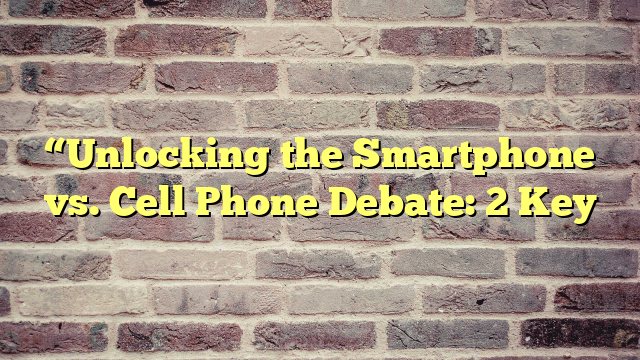Introduction
The debate between smartphones and cell phones has been ongoing for years, with proponents of each side arguing their superiority. While both devices serve the basic function of making calls and sending messages, there are distinct differences between the two. In this article, we will explore the key differences between smartphones and cell phones, and the advantages and disadvantages of each.
Subheading 1: History of Cell Phones and Smartphones
The first cell phone, known as the “brick”, was invented in 1973 by Martin Cooper. However, it wasn’t until the 1990s that cell phones became more widely available to the public. These early cell phones were primarily used for making calls and sending texts, with limited features and basic designs.
On the other hand, smartphones were first introduced in the early 2000s and revolutionized the way we communicate. With advanced features such as internet browsing, music and video playback, and downloadable apps, smartphones quickly gained popularity and became a must-have device for many.
Subheading 2: Definition and Features of Cell Phones
A cell phone, also known as a feature phone, is a mobile device that allows for voice calls and text messaging. It typically has a basic operating system and limited features, such as a camera, calculator, and basic internet access. Cell phones are often more affordable than smartphones and are a popular choice for those who only need a device for basic communication.
Subheading 3: Definition and Features of Smartphones
A smartphone is a more advanced mobile device that offers a range of features and capabilities. In addition to making calls and sending messages, smartphones have a touchscreen interface, access to the internet, and the ability to download and use apps. These devices also have high-resolution cameras, music and video playback, and various other features such as GPS, voice assistants, and biometric security.
Subheading 4: Key Differences between Cell Phones and Smartphones
1. Operating System: Cell phones typically use a basic operating system, while smartphones use advanced operating systems such as iOS or Android.
2. Internet Access: Smartphones have internet access through Wi-Fi and cellular data, while cell phones may have limited or no internet access.
3. Apps: Smartphones have access to a wide range of downloadable apps, while cell phones may have limited or no app availability.
4. Screen Size and Quality: Smartphones have larger and higher-resolution screens compared to cell phones, making them better for tasks such as watching videos or browsing the internet.
5. Price: Cell phones are generally more affordable than smartphones, making them a popular choice for those on a budget.
6. Battery Life: Cell phones tend to have a longer battery life than smartphones, as they have fewer features and are not constantly connected to the internet.
7. Upgrades: Smartphones are constantly evolving and new models are released frequently, while cell phones may have fewer upgrades available.
Subheading 5: Advantages of Cell Phones
1. Affordability: As mentioned earlier, cell phones are generally more affordable than smartphones, making them a popular choice for those looking for a budget-friendly device.
2. Simplicity: Cell phones have a basic design and limited features, making them easy to use for those who are not tech-savvy.
3. Longer Battery Life: With fewer features and apps, cell phones tend to have a longer battery life compared to smartphones.
4. Durability: Cell phones are often more durable than smartphones, as they are designed for basic communication and are not as fragile.
Subheading 6: Advantages of Smartphones
1. Advanced Features: Smartphones offer a wide range of advanced features such as internet access, apps, high-quality cameras, and more, making them a versatile and all-in-one device.
2. Access to Information: With internet access and various apps, smartphones allow for easy access to information, making it a useful tool for work, education, and entertainment.
3. Constant Connectivity: Smartphones are constantly connected to the internet and allow for real-time communication, making it easy to stay connected with friends, family, and colleagues.
4. Upgradability: As technology advances, new smartphone models are released, offering upgraded features and capabilities.
Subheading 7: Disadvantages of Cell Phones and Smartphones
1. Limited Features: Cell phones have limited features compared to smartphones, while smartphones may have features that may not be useful to everyone.
2. Addiction: With constant access to the internet and various apps, smartphones can be addictive and lead to excessive screen time, affecting mental and physical health.
3. Cost: Smartphones can be expensive, with the latest models costing hundreds or even thousands of dollars.
4. Security Risks: With internet access and downloadable apps, smartphones may be at risk for malware or hacking, compromising personal information.
Conclusion
In conclusion, both smartphones and cell phones have their own advantages and disadvantages. While smartphones offer advanced features and capabilities, cell phones are a more

